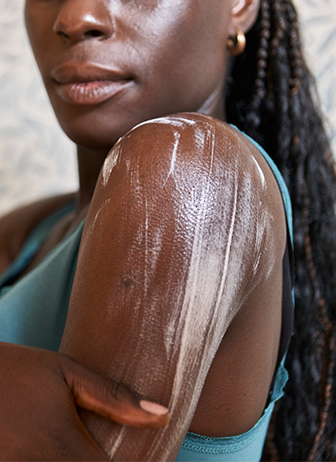An Introduction to Topical Steroid Withdrawal (TSW)
Unheard of by many people, Topical Steroid Withdrawal – or TSW – is a skin condition that can be caused by the the use of Steriods to treat other conditions like Eczema. It’s important to know that this phenomenon is quite new and always developing, so more research is needed. But for now, here’s an introduction to Topical Steroid Withdrawal causes and everything else we know about TSW.
- What are topical steroids?
- What is Topical Steroid Withdrawal?
- Are topical steroid creams safe to use?
- What are the symptoms of Topical Steroid Withdrawal?
- How can you treat Topical Steroid Withdrawal?
- How can you prevent Topical Steroid Withdrawal?
- Find out more about Topical Steroid Withdrawal (TSW)
What are Topical Steroids?
Before we can even start to understand TSW, we need to know what a topical steroid is. Also known as corticosteroids, they’re a type of medicine applied directly to the skin to reduce inflammation and irritation – so they do a great job of calming down angry Eczema and Psoriasis. You can apply them as a cream, lotion, gel, ointment or in other ways too, and they’re available a few different strengths.¹
What is Topical Steroid Withdrawal?
What is TSW and what causes TSW are a very similar questions – so we’ll answer them together. When someone stops using topical steroids, the condition they were treating (such as Eczema) often returns. But on top of this, research suggests that there’s some extra symptoms which are a result of the steroid cream withdrawal.
It’s not clear exactly why or how this happens, but it could be that the Eczema has returned stronger than before because the skin has been altered in some way – or the cream has affected the body’s normal steroid production. Usually, topical steroids stop the condition from coming back, so you can put the tube to the back of the bathroom cupboard and forget about it. However, if Eczema flares up badly when you stop using the cream, or if even strong topical steroids don’t seem to help, this is when TSW could crop up.²
Are topical steroid creams safe to use?
These types of creams are a safe and effective treatment for skin conditions. But as with any drug, there can be side effects – and you should always follow doctor’s orders. They’ll explain where and how the cream you’re prescribed should be applied, so do your best to stick to the amounts they suggest. Using too much can make the skin thinner or change its colour – but not using enough can extend treatment time and increase the risk of side effects. We know it’s a difficult balance!
So how do you know how much is right? Fingertip application guides are really helpful, particularly if you’re applying for children. And a lot of the time, topical steroids are prescribed alongside emollients – so it’s important to combine these two treatments properly too. It’s best to wait 20 to 30 minutes between applying them both, as emollients can dilute the steroid to make it less effective.³
(Sources: National Eczema Society⁴; British Association of Dermatologists⁵ and the MHRA⁶.)
If you do experience symptoms like this after you stop using topical steroids, it’s really helpful to report these to the MHRA’s yellow card scheme as well as your doctor. This will provide much-needed information on TSW and help make this type of treatment even safer for everyone.
How can you treat Topical Steroid Withdrawal?
If you recognise any of the symptoms we’ve just listed – especially if you’re feeling ill – then you should speak to a GP urgently to request a referral to Dermatologist. (Or if you’re already with one, they might offer an emergency telephone call-back option.)
You can also go along to A&E if the symptoms are particularly severe. As TSW or Eczema steroid withdrawal is quite new, doctors or nurses may not always instantly recognise the term – but it will be treated as a medical emergency.
It’s important to remember that this type of reaction is very rare. For the majority of people, the worst thing they experience when they stop using steroid creams is a return of their original Eczema symptoms (still painful, we know!) However, TSW can be something to bear in mind.⁷
How can you prevent Topical Steroid Withdrawal?
If you’re using topical steroid creams and are worried that it’s harming your skin, the best thing to do is speak to your doctor – especially if you’ve been using them for long periods of time. They can look at alternative options, discuss the way you’re using the cream, or possibly refer you to a Dermatologist. You shouldn’t ever just stop using your cream in the middle of a treatment plan, as your skin needs to be weaned off gradually.⁸
When considering how to avoid Topical Steroid Withdrawal, it can also be helpful to look at alternatives to steroid creams. Emollients like Epaderm Ointment or Epaderm Cream help to soothe the effects of Eczema with just a handful of steroid-free, clinically proven ingredients – so you can pile on as much as you like, for as long as you like!
Find out more about Topical Steroid Withdrawal (TSW)
With so much still to learn about TSW, it can sometimes be a controversial topic. Topical steroid creams are still a safe and effective way to treat Eczema, so there’s no need to worry if you’re prescribed this as a treatment. However, it’s always helpful to stay up-to-date with emerging research around TSW – and understand that this is a real condition with real symptoms.
Here are some more useful resources to help:
The British Association of Dermatologists
Medicines and Healthcare Products Regulatory Agency
Epaderm Library
Our website is jam-packed full of useful information from our skin blogs, user case studies to our in-depth FAQs. Discover more by clicking on the relevant section!References
¹ https://www.nhs.uk/conditions/topical-steroids/
² https://eczema.org/information-and-advice/topical-steroid-withdrawal-tsw/#safe
³ https://assets.publishing.service.gov.uk/government/uploads/system/uploads/attachment_data/file/1073464/PSL-Topical-Corticosteroids-April_2022.pdf
⁴ https://eczema.org/information-and-advice/topical-steroid-withdrawal-tsw/#safe
⁵ https://www.skinhealthinfo.org.uk/national-eczema-society-and-british-association-of-dermatologists-joint-position-statement-on-topical-steroid-withdrawal/
⁶ https://assets.publishing.service.gov.uk/government/uploads/system/uploads/attachment_data/file/1073464/PSL-Topical-Corticosteroids-April_2022.pdf
⁷ https://eczema.org/information-and-advice/topical-steroid-withdrawal-tsw/#safe
⁸ https://eczema.org/information-and-advice/topical-steroid-withdrawal-tsw/#safe


















